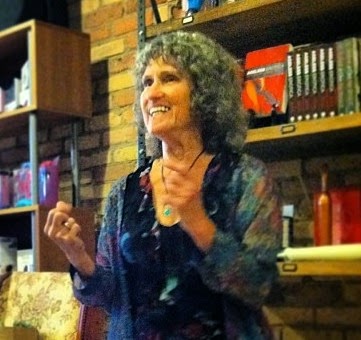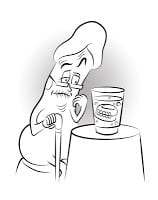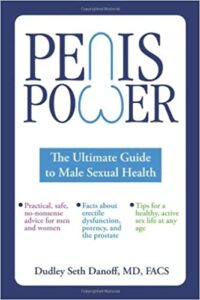Posts Tagged ‘medical attitudes towards sex and aging’
Doctors, Talk to Us about Our Sex Lives!
 |
4/3/16: I’m bringing this 2014 post to the top because I’m giving a talk to doctors and other medical professionals tomorrow in Milwaukee. I want these comments from my readers to be easy to find if they read my blog after that — which I hope they will!
About half of all sexually active men and women aged 57-85 in the United States report at least one bothersome sexual problem; one third report at least two. Yet only 38 percent of men and 22 percent of women reported having discussed sex with a physician since the age of 50 years.
Why does this information barrier exist? And what can you, as professionals, do to overcome it with your patients and clients?
These are the questions I posed to the attendees at the beginning of “Talking about Senior Sex:
A Presentation for Medical Professionals, Therapists, and Others Working Professionally with the Older-Age Population,” which I presented at The Smitten Kitten in Minneapolis on June 19, 2014.
I was so jazzed by the responses during that workshop that I wanted to continue the discussion, so I took it to my Naked at Our Age Facebook page (which I invite you to read and “like”).
Our community jumped in eagerly with their comments and experiences. Here are some of those:
- It would suffice if they just asked. I think they are 1) embarrassed, and 2) afraid that a nestful of psychological tangles would emerge, which would take a lot of their time. As a doctor, you would have to believe that relationships, beliefs, and habits contributed to illness, and I think most of them are just looking for a set of symptoms. The mind-body connection is far from their thoughts.
- It may be difficult for physicians to broach topics on sex because of their lack of education on sexual matters – not just with senior sexuality. Often such topics are delegated to nurse specialists or physician assistants. There are also shades of sexuality beyond the range of physiology, endocrinology, anatomy, and other hard sciences that are beyond the scope of topics covered in med school and continuing medical education. We need to take charge and help drag medical providers along with us on this topic.
- Sex over 55 is often challenging if your parts are in perfect working order, but if they are not, then it’s an entirely different ball game. As someone who has lived with a sexual challenge for 20 years (and who is now 67), I found, in the beginning that it was helpful to write a letter to the doctor prior to the appointment – an ice-breaker. Now, however, after such a long-term medical problem, I am really very open with all the doctors I see and they either handle it or they don’t – they can choose!
- We live in a culture that allows only a few sexual subjects to be discussed and those in limited ways. Having lived a lifetime hiding or being ashamed of our sexual natures, it can be a huge challenge to just start talking about “it” when we reach those years. The mechanics of sex may be easier to discuss than unmet needs and innate desires. It is a gift to be sexually sovereign in our culture.
- In my case, no doctor ever broached the subject. I was always the initiator. After 12 years of fertility work, four ectopic pregnancies, numerous spontaneous abortions and nerve damage resulting from a rape, surgeries and malpractice (they refused to remove the infamous Dalkon Shield IUD after the rape and subsequent STD infection), it’s not a stretch to understand why I had a damaged libido. Only with recent help from two amazing physicians, with whom I can discuss anything, have I begun to find help! Finding this and other groups online has also been salvation of yet another kind. Thanks for opening so many doors to those of us who have foundered for so long!
- Actually, it was through conversations with my nurse practitioner that my road to sexual freedom opened up. Also through my wonderful husband’s patience, and Joan’s book, Naked at Our Age. There is a taboo about sex at a certain age, but for us it has just been renewed!
- Particularly as sex and disability is also a taboo subject and many people will have genital dermatoses and that will make it even harder for them to open up to anyone. I am 67 and despite lichen sclerosis, I remain sexually active.
- The doctor needs to be calm, confident and comfortable with the subject. If the doctor is squirmy and clearly uncomfortable, it won’t help the patient to open up. Speaking for myself, if I’m a little squirmy and hesitant, I’d appreciate it if the doctor would give me the time and space to squirm a little and build up my courage. I had that experience with a doctor; he asked what was clearly a scripted question, I hemmed and hawed a little struggling to express an answer. Since the answer wasn’t immediately forthcoming he just jumped right to the next question. I got the distinct feeling he really didn’t want to hear it, so the subject was dropped. On the other hand, a doctor might ask a question and get a very forthright answer they weren’t expecting. They better be ready for that too; no eyes bugging out, no jaw dropping, no flinching. They might need to develop the ‘warm positive regard’ thing that therapists are taught.
- I’m 73, have an older woman doctor trained in Europe who brought the subject up in the course of an annual physical, and was quite matter of fact about it, made me quite comfortable discussing the subject, and referred me to an endo.
- I’m not your target age group but my nurse practitioner at Kaiser simply asked if I was happy with my sex life and, after I affirmed that I was, proceeded to tell me that orgasm was good for my vaginal health (not to mention my psyche) and encouraged me to take charge of my pleasure because it would help make perimenopause easier to take, keep my bladder where it belongs and generally support my wellbeing. Hell yeah -this I knew – but what was even better was that she made it clear that she was there to help. My sexual health was not some secondary aspect. It was a full-fledged piece of my gynecological workup. To which I say – well done!
- I’d like to see it simply become a matter of routine during all regular check ups, or anytime the visit is for more than a sniffle really, as well as anytime mental health/ relationships are discussed. We need to be in the habit of treating the whole person, not just fixing bits and pieces and mending boo-boos.
I hope you’ll continue this important conversation by commenting here. (And if you’d like me to bring this presentation to your organization, please contact me.)
Penis Power: Interview with Dudley Danoff
Urologist Dudley S. Danoff, MD, FACS, is the author of Penis Power: The Ultimate Guide to Male Sexual Health (Del Monaco Press, 2011). It’s an upbeat and even entertaining guide to the complexities, myths, facts, and vagaries of owning a penis (or, in my case, liking penises and being endlessly fascinated by them). Dr. Danoff covers how they work and what’s going on when they don’t work—psychologically as well as physiologically.
My male readers often write me with age-related questions about their penises: what’s a “normal” change with age vs. what’s a medical problem, how they can deal with erection difficulties, how to negotiate new needs and issues with a partner. “We are tragically ill-informed about the penis,” says Dr. Danoff, and he aims to change that.
Although this book is not specifically aimed at our age group, all of it applies to us, and I guarantee you’ll say, “I didn’t know that” several times as you read, even if you’ve owned a penis for 50, 60, or 70 years.
I invited Dr. Danoff to answer questions that specifically address men age 60+ and the women in their lives. I welcome your comments.
Q: What is your big message to our older men?
A: Sex is good for you. It maintains overall physical strength and cardiovascular health, and most of all, it keeps you invigorated. A man’s penis is there to serve him from puberty to old age.
Q: What are the most common misunderstandings that men age 60+ have about their penises or about their sexuality in general? What do you wish all men knew as they aged?
 A: By far, the most frequent complaint I hear from men is that they do not have the same level of sexual desire they used to have. It takes longer to get an erection, it takes longer to ejaculate, it takes longer to get aroused again after they make love, and their erections are not as firm. These conditions are all predictable changes that occur as men get older.
A: By far, the most frequent complaint I hear from men is that they do not have the same level of sexual desire they used to have. It takes longer to get an erection, it takes longer to ejaculate, it takes longer to get aroused again after they make love, and their erections are not as firm. These conditions are all predictable changes that occur as men get older.
Attitude is the key to penis longevity. My super-potent patients tell me that sex gives them as much joy at 70 as it did at 20. Some say the sex is even better! Equal pleasure can be obtained from occasional, prolonged intercourse with one orgasm as with frequent, rapid intercourse with multiple orgasms.
All men, as they age, deserve active, healthy sex lives as long as they remain physically fit. Do not expect to do at 60 what you did at 40. Adjust your sexual activities as your body changes, just as you adjust other activities. Look upon the adjustment as both a new challenge and a new opportunity.
As you age, learn to use your mind and imagination to make up in creativity what you may lack in physical strength. As long as you are able to breathe, move your extremities, maintain relative control over your bodily functions, remain alert enough to identify the date and day of the week, and sustain a positive mental outlook, you can continue to exercise your penis power indefinitely.
Q: What would you say to many men age 60+ who tell me that they don’t get good information or direction from their urologists when they report undependable or nonexistent erections? They are commonly told, “Well, you’re older now,” or “It’s ED,” without a medical workup to see whether some underlying condition is causing the ED.
A: Find another urologist who is knowledgeable about erectile dysfunction and is willing and able to thoroughly evaluate you. A comprehensive evaluation, including a full cardiovascular evaluation, by a qualified urologist is essential. Endocrine issues, such as low testosterone or unrecognized diabetes, can then be treated, and erectile dysfunction will improve. Knowledge is power. There are many treatments on the urologic menu for erectile dysfunction, but first you need a proper diagnosis to identify the underlying cause. Treatment is both available and effective in almost all cases and will result in satisfactory erections.
Q: Many men would rather sever their own leg than admit to a doctor that they are experiencing erectile difficulties. Why is it important to see a doctor before self-treating with drugs or other assists?
A: Many serious medical conditions that are first manifested by erectile difficulties go unrecognized. It is absolutely essential to get a full evaluation by a qualified urologist in all cases of erectile dysfunction in order to determine the presence or absence of some serious (or not so serious) medical problem and treat it accordingly. For example, if low serum testosterone is found, testosterone replacement therapy can give spectacular results. Under no circumstances should a man self-treat his erectile dysfunction with over-the-counter preparations without first determining the presence or absence of an underlying medical condition that is correctable.
Q: How can women enhance their partner’s and their own sexual pleasure when erections and intercourse are not the main events?
 A: Most importantly, do not think old! Sexual pleasure is all about attitude. If your mind is strong and your partner’s mind is strong, intimacy and sex without vaginal penetration can be enormously pleasurable. The key is not to lament what you have lost. Be grateful for what you still have and make the most of it. Age is not a deterrent to great sex. Rather, it is a challenge and an opportunity.
A: Most importantly, do not think old! Sexual pleasure is all about attitude. If your mind is strong and your partner’s mind is strong, intimacy and sex without vaginal penetration can be enormously pleasurable. The key is not to lament what you have lost. Be grateful for what you still have and make the most of it. Age is not a deterrent to great sex. Rather, it is a challenge and an opportunity.
If you keep your enthusiasm, you can compensate for or even delay the effects of aging. You do not stop having sex because you are old—you get old because you stop having sex! Talking candidly with your partner about aging is the best way to find a solution for maintaining a healthy sex life.
Q: What else do you want women to understand about their male partners?
A: Older men are just as penocentric as younger men are, even though capacity may be diminished. I would encourage older women to become more “penis oriented.” Older women who are penis oriented have more fun and also have better marriages, more faithful partners, and greater personal fulfillment in all aspects of their lives. If you believe that each partner has the mutual responsibility to satisfy the other’s needs, then it follows that you will hold up your end of the bargain as a woman by making your partner’s penis one of your top priorities.
Being penis oriented does not imply a belittlement of female sexuality. It simply means learning to understand and accommodate an older man’s penis needs by approaching that task with all of the pride and skill that you would bring to any other endeavor. I assure the older woman that if you take the steps to become informed, you and your man will reap rewards you have only dreamed about.
Images are from Penis Power: The Ultimate Guide to Male Sexual Health by Dudley Seth Danoff, MD. ©2011 Dudley Seth Danoff. Reprinted by permission of Dudley Seth Danoff. Copies of the book are available at your local bookstore or may be ordered through Amazon.com.
Healing Painful Sex: Interview with Deborah Coady, MD
consulted several experts for their advice in chapter 11 of Naked at Our Age: “When Sex Hurts: Vulvar/Vaginal Pain,” but reading that chapter is just the beginning of solving that problem. You need a diagnosis – vaginal/vulvar pain can be caused by a number of medical issues, and you need to understand why you’re having pain before you can get it treated effectively.
by Deborah Coady, MD and Nancy Fish, MSW, MPH. This book is entirely devoted to sexual pain in women: the myriad possible causes, how to figure out which one or combination is yours, and what to do about it.
Q. My readers sometimes report that after a long time without sex (due to lack of a partner or disinterest from a partner), they try to have sex again — and they can’t: It’s too painful. What should a woman do about this?
A: On average, about 5-6 years after their last menses, most women develop thinning of their vulvar and vaginal tissues, often causing pain with sexual touching or intercourse, or with urination after sexual activity, or itching, burning and even surface bleeding after sex. This can occur even in women taking systemic estrogen therapy. As estrogen levels decline both the surface skin and underlying connective tissues thin, shrink, and lose elasticity. Most pain is actually located at the vaginal opening itself, rather than deep inside the vagina as previously thought. The good news is that since these tissues are exquisitely hormonally sensitive, even small doses of estrogen, with or without testosterone or DHEA, applied to the vaginal opening (the vestibule), can reverse these changes within 2-4 weeks, and then even lower doses can be used to maintain the improvement. Some women with severe loss of elasticity will also be helped by a course of pelvic floor manual physical therapy, to help
normalize the connective tissue, and relieve the reflexive muscle spasms that some women develop due to their pain.
Q. I like your questionnaire (107-111) because women often don’t know how to pin down just where and what the pain is that they’re experiencing. I recommend that women scan or photocopy that questionnaire to show their medical professionals. Would it be a good idea to
carry a copy of Healing Painful Sex to the appointment, too, in case the doc hasn’t heard of your book?
A: One of our missions in writing the book is that women would have it as a resource to get their gynecologists informed and up to speed on treating sexual pain. Many patients have done just this, and their MDs have actually been grateful for the introduction to the book.
Q. If a gynecologist says, “You just need lubricant” or – worse! – “Well, at your age, you can expect that,” what should an older woman say to get diagnosis and treatment? I tell women to say, “If you don’t know how to help me, please refer me to someone who does,” but that might
seem more confrontational than you would recommend! What would you advise her to say?
A: I would advise her to say exactly that. We have to advocate for ourselves and we deserve up-to-date treatment for sexual pain. A healthy
sexual life is a basic human right, even defined as so by the World Health Organization!
Q. How can a post-menopausal woman weigh the benefits of HRT vs. the health risks if she’s experiencing vaginal thinning and tearing?
A: There is absolutely no evidence that the small amount of estradiol or estriol available for use at the vaginal opening is absorbed to any degree that would induce breast cancer. The doses are tiny compared to HRT doses that are meant to be systemic, that is, to go to all parts of the body. To help hot flashes the doses need to reach the brain in quantities much much higher than the topical estrogen will ever give. And with the evidence now showing that estrogen alone does not increase the risk of breast cancer anyway, women can be assured that topical therapy, especially if mostly applied to the vaginal opening, is safe. It is also now known that the thicker and more estrogenized the vulvar and vaginal tissues are, the less absorption into the body. So a stable constant regimen is better than going on and off the topicals, with the tissues thinning again in between.
Q. How do we educate our medical professionals to stop being dismissive and take our sexuality seriously, whether we’re 60, 70, or 80?
A: This is a work in progress, but educational outreach through professional societies like NAMS, the International Pelvic Pain Society (IPPS), and the International Society for the Study Of Vulvovaginal Disorders (ISSVD), as well as patient advocacy organizations, especially the National Vulvodynia Association (NVA) is helping. The websites of these societies all list health professionals by area to help patients find a knowledgeable MD. We also need to devote more time to formal education on sexuality and pain in medical schools and residency programs.
As always, I welcome your comments. If you’re experiencing pain with sex, I hope you’ll read both Naked at Our Age and Healing Painful Sex. Then please carry both books with you to show your doctor!
Doctor, Doctor, Talk to Us about Senior Sex
Angry and/or bewildered readers write me or raise their hands at my talks with tales of doctors who can’t or won’t inform them about sex.
Just a few of the many examples seniors have shared with me:
- One woman described how her oncologist bolted from the room when she asked how her cancer treatment would affect her sexuality.
- A man emailed me that he finally got the nerve to tell his doctor that he could no longer have erections. “You have ED,” he was told, and that was that. I was the one to tell him that ED is a symptom, not a diagnosis, and he needed to get tests run to find out what was going on.
- Several women with vaginal pain reported that their doctors offered them no help other than telling them their vaginas were “normal” and they should just use more lubricant. A referral to a vulvar pain specialist or a pelvic floor therapist would have helped these women enjoy sex again.
- Several men told me that they were never told that treatments for their medical conditions would interfere with their erectile difficulty and that other options were available.
A woman at one of my bookstore talks told a roomful of sympathetic listeners that after a hysterectomy at age 70+, she asked her doctor what she should know about resuming sex. He asked, “Do you have a partner?” “No, she replied. “Then you don’t need to worry about that, do you?”
When I retell this story in different parts of the country on my travels, there’s always someone who says, “I know that doctor!”
 I always rush to defend doctors, being a doctor’s daughter and a doctor’s sister, and having had my own life saved and quality of life restored by brilliant medical professionals.
I always rush to defend doctors, being a doctor’s daughter and a doctor’s sister, and having had my own life saved and quality of life restored by brilliant medical professionals.
But that doesn’t mean that I think doctors and other medical professionals adequately address senior sex — they do not. I know that their medical training barely addresses sexuality at all, and doesn’t deal with senior sex whatsoever. Unless doctors make an effort to educate themselves (and bless ’em, some do!), they just don’t know what to tell us.
I give my readers and audiences tools for talking to their doctors, for example, saying, “If you can’t help me with this, give a referral to someone who can.”
The worst thing we can do is keep silent about our sexual challenges or mumble and give up.
I invite your comments — your stories about doctors who have or have not helped you regarding your sexuality, and especially what you would like doctors to know about what we seniors/boomers/elders need from them in that realm.
For example, Ron posted to my Naked at Our Age Facebook page (which I hope you’ll visit and “like”!), “Docs need to be up on the sexual side effects of medications and we need to be sure to tell docs we don’t want any meds that somehow reduce our libido or capability.”
Your turn!



